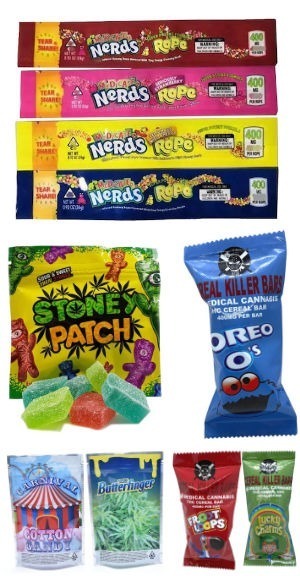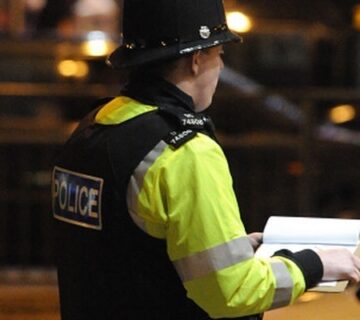Cannabis Edibles
What are Cannabis Edibles?
Edibles are food products that may contain cannabis. There are many forms of edibles, including sweets, gummies, and lollipops. They usually contain – or are marketed as containing – several chemicals, many of which are harmful and controlled under the Misuse of Drugs Act (1971) including tetrahydrocannabinol (THC). THC is the psychoactive compound in cannabis and can make people feel a range of effects, while cannabidiol (CBD) is the non-psychoactive chemical compound which does not have the same effect. Any CBD product containing THC is illegal in the UK.
The sweet versions are widely available on the internet and via social media and may be easily accessed by young people. The packaging is often deliberately targeted to attract young people. There is NO quality control of these products.
What are the concerns about Cannabis Edibles?
The amount of cannabis in these products can vary greatly and sometimes other harmful drugs are added too. The effects of consuming edibles are unpredictable, and it can be very easy to accidentally take a larger dose. Edibles take between 1-3 hours to have an effect because food is absorbed into the bloodstream through the liver. Because it takes longer, the person taking them may end up consuming larger amounts of the drug while thinking the drug isn’t working. As edibles may look like other products, there is also the risk someone may ingest them without realising they contain drugs – this could include other children in the home.
Displayed side effects may include:
Paranoia, panic attacks, nausea, impaired mobility, hyperactivity, elevated heart rate, hallucinations.
What can you do?
 We recommend monitoring food packaging/wrappers, looking for wording such as CBD or THC suggesting the items are cannabis oil infused. (See image right)
We recommend monitoring food packaging/wrappers, looking for wording such as CBD or THC suggesting the items are cannabis oil infused. (See image right)
For the latest information on drug trends, visit the Frank news page.
Please be mindful of the medical needs should a child present with symptoms, or if you suspect they have consumed a drug-laced substance. In a medical emergency call 999.
Law
Any drug with THC in is classed as a class B under the Misuse of Drugs Act 1971
If you are made aware of any social media accounts advertising these items, we ask you report this information to the police, school, or log your concerns anonymously using Crime Stoppers.
You can also report any incidents to us online: Devon and Cornwall Police.

Classroom Resources
Cover the statutory Health Education requirements with our drug and alcohol lesson packs
Category: Drugs, County Lines
Audience: KS1, KS2, KS3, KS4, KS5
Developed by: PSHE Association
Duration (minutes): 30+
Keywords: drugs, county lines, alcohol
The PSHE Association drug and alcohol schemes of work for key stages 1-4 have been developed for Public Health England. This pack includes lesson plans and resources for each key stage — with knowledge organisers included — as well as a comprehensive teacher guidance document, a briefing on the evidence base underpinning effective drug and alcohol education, and governors’ briefing. Interactive PowerPoint lesson plans are also available, for members of the Association.
Support pupils with SEND to explore the facts, laws, risks and consequences associated with drug and alcohol use, as well as the dangers of household products and prescribed medications.
Category: Drugs, County Lines
Audience: SEND
Developed by: PSHE Association
Duration (minutes): <60
Keywords:
These lesson plans and slides are designed to be used flexibly, and can be adapted to meet the needs and abilities of your pupils. Each lesson provides several main activities for you to choose from, which are based on the progression stages outlined in our Planning Framework for Pupils with SEND.
The lesson plans from the Home Office are designed to prevent young people becoming involved in serious and organised crime.
Category: Crime and ASB, Drugs, County Lines
Audience: KS3
Developed by: PSHE Association
Duration (minutes): 2×60
Keywords:
The Year 7 lesson will help students recognise unsafe or coercive friendships. The Year 9 lesson explores the impact of serious and organised crime directly, including the example of young people involved in drugs supply with a focus on county lines (transporting drugs across counties).
KS3 form time activities
Category: Drugs
Audience: KS3
Developed by: NHS
Duration (minutes): -30 mins
Keywords:
In these 3 form time sessions, students learn about social pressures around vaping, its impact, and the effects of nicotine on the adolescent brain.
Consequences of vaping and challenging the influences that might encourage young people to vape
Category: Drugs
Audience: KS3
Developed by: PSHE Association
Duration (minutes): 60
Keywords: vaping, consequences, harm
A year 9 lesson exploring the consequences of vaping and challenging the influences that might encourage young people to vape. Designed to follow on from the Year 9 lessons in our existing suite of drug and alcohol education lessons, this lesson will help students understand the impact of influences, influencers and marketing on vaping-related choices and behaviours, explain the consequences of vaping, including the environmental cost of e-cigarettes, analyse ways to challenge influences and misconceptions about vaping





